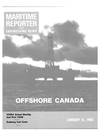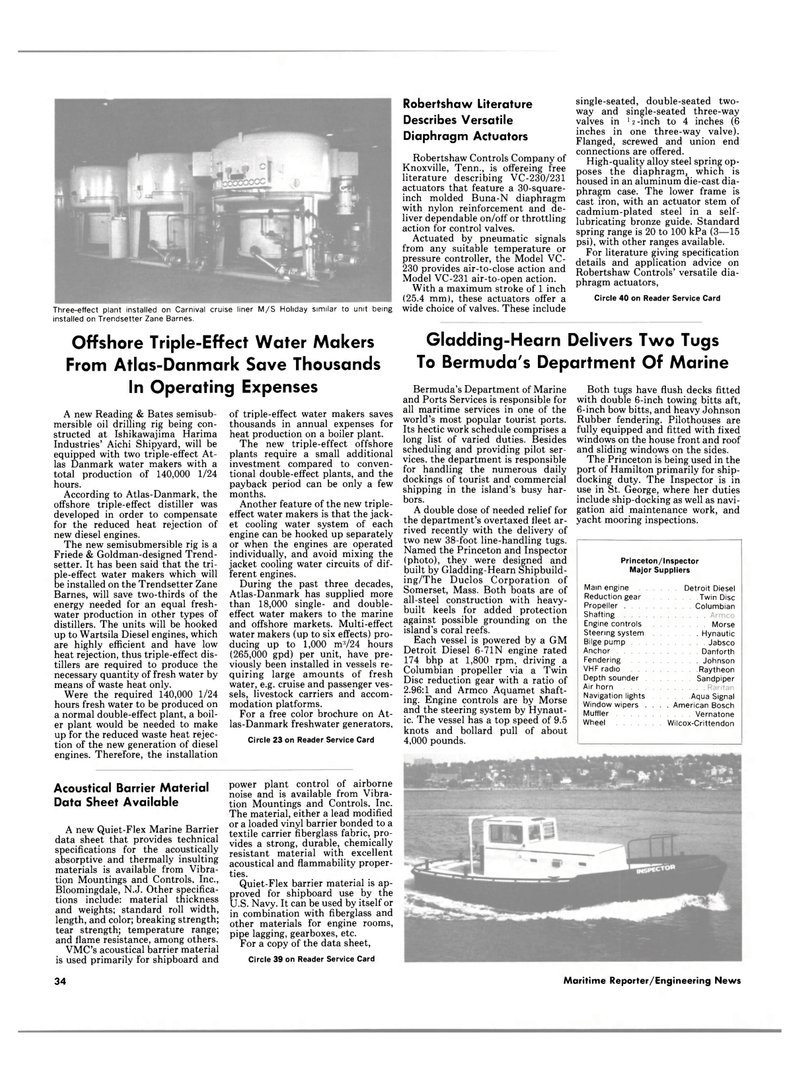
Page 32: of Maritime Reporter Magazine (January 15, 1986)
Read this page in Pdf, Flash or Html5 edition of January 15, 1986 Maritime Reporter Magazine
Three-effect plant installed on Carnival cruise liner M/S Holiday similar to unit being installed on Trendsetter Zane Barnes.
Robertshaw Literature
Describes Versatile
Diaphragm Actuators
Robertshaw Controls Company of
Knoxville, Tenn., is offereing free literature describing VC-230/231 actuators that feature a 30-square- inch molded Buna-N diaphragm with nylon reinforcement and de- liver dependable on/off or throttling action for control valves.
Actuated by pneumatic signals from any suitable temperature or pressure controller, the Model VC- 230 provides air-to-close action and
Model VC-231 air-to-open action.
With a maximum stroke of 1 inch (25.4 mm), these actuators offer a wide choice of valves. These include single-seated, double-seated two- way and single-seated three-way valves in 12 -inch to 4 inches (6 inches in one three-way valve).
Flanged, screwed and union end connections are offered.
High-quality alloy steel spring op- poses the diaphragm, which is housed in an aluminum die-cast dia- phragm case. The lower frame is cast iron, with an actuator stem of cadmium-plated steel in a self- lubricating bronze guide. Standard spring range is 20 to 100 kPa (3—15 psi), with other ranges available.
For literature giving specification details and application advice on
Robertshaw Controls' versatile dia- phragm actuators,
Circle 40 on Reader Service Card
Offshore Triple-Effect Water Makers
From Atlas-Danmark Save Thousands
In Operating Expenses
Gladding-Hearn Delivers Two Tugs
To Bermuda's Department Of Marine
A new Reading & Bates semisub- mersible oil drilling rig being con- structed at Ishikawajima Harima
Industries' Aichi Shipyard, will be equipped with two triple-effect At- las Danmark water makers with a total production of 140,000 1/24 hours.
According to Atlas-Danmark, the offshore triple-effect distiller was developed in order to compensate for the reduced heat rejection of new diesel engines.
The new semisubmersible rig is a
Friede & Goldman-designed Trend- setter. It has been said that the tri- ple-effect water makers which will be installed on the Trendsetter Zane
Barnes, will save two-thirds of the energy needed for an equal fresh- water production in other types of distillers. The units will be hooked up to Wartsila Diesel engines, which are highly efficient and have low heat rejection, thus triple-effect dis- tillers are required to produce the necessary quantity of fresh water by means of waste heat only.
Were the required 140,000 1/24 hours fresh water to be produced on a normal double-effect plant, a boil- er plant would be needed to make up for the reduced waste heat rejec- tion of the new generation of diesel engines. Therefore, the installation of triple-effect water makers saves thousands in annual expenses for heat production on a boiler plant.
The new triple-effect offshore plants require a small additional investment compared to conven- tional double-effect plants, and the payback period can be only a few months.
Another feature of the new triple- effect water makers is that the jack- et cooling water system of each engine can be hooked up separately or when the engines are operated individually, and avoid mixing the jacket cooling water circuits of dif- ferent engines.
During the past three decades,
Atlas-Danmark has supplied more than 18,000 single- and double- effect water makers to the marine and offshore markets. Multi-effect water makers (up to six effects) pro- ducing up to 1,000 m:i/24 hours (265,000 gpd) per unit, have pre- viously been installed in vessels re- quiring large amounts of fresh water, e.g. cruise and passenger ves- sels, livestock carriers and accom- modation platforms.
For a free color brochure on At- las-Danmark freshwater generators,
Circle 23 on Reader Service Card
Bermuda's Department of Marine and Ports Services is responsible for all maritime services in one of the world's most popular tourist ports.
Its hectic work schedule comprises a long list of varied duties. Besides scheduling and providing pilot ser- vices. the department is responsible for handling the numerous daily dockings of tourist and commercial shipping in the island's busy har- bors.
A double dose of needed relief for the department's overtaxed fleet ar- rived recently with the delivery of two new 38-foot line-handling tugs.
Named the Princeton and Inspector (photo), they were designed and built by Gladding-Hearn Shipbuild- ing/The Duclos Corporation of
Somerset, Mass. Both boats are of all-steel construction with heavy- built keels for added protection against possible grounding on the island's coral reefs.
Each vessel is powered by a GM
Detroit Diesel 6-71N engine rated 174 bhp at 1,800 rpm, driving a
Columbian propeller via a Twin
Disc reduction gear with a ratio of 2.96:1 and Armco Aquamet shaft- ing. Engine controls are by Morse and the steering system by Hynaut- ic. The vessel has a top speed of 9.5 knots and bollard pull of about 4,000 pounds.
Both tugs have flush decks fitted with double 6-inch towing bitts aft, 6-inch bow bitts, and heavy Johnson
Rubber tendering. Pilothouses are fully equipped and fitted with fixed windows on the house front and roof and sliding windows on the sides.
The Princeton is being used in the port of Hamilton primarily for ship- docking duty. The Inspector is in use in St. George, where her duties include ship-docking as well as navi- gation aid maintenance work, and yacht mooring inspections.
Princeton/Inspector
Major Suppliers
Main engine . . . . . . Detroit Diesel
Reduction gear Twin Disc
Propeller Columbian
Shafting
Engine controls Morse
Steering system Hynautic
Bilge pump .... Jabsco
Anchor Danforth
Fendering . . . . Johnson
VHF radio . . . . Raytheon
Depth sounder . . Sandpiper
Air horn
Navigation lights . Aqua Signal
Window wipers . . . . American Bosch
Muffler Vernatone
Wheel . Wilcox-Crittendon
Acoustical Barrier Material
Data Sheet Available
A new Quiet-Flex Marine Barrier data sheet that provides technical specifications for the acoustically absorptive and thermally insulting materials is available from Vibra- tion Mountings and Controls, Inc.,
Bloomingdale, N.J. Other specifica- tions include: material thickness and weights; standard roll width, length, and color; breaking strength; tear strength; temperature range; and flame resistance, among others.
VMC's acoustical barrier material is used primarily for shipboard and 34 power plant control of airborne noise and is available from Vibra- tion Mountings and Controls, Inc.
The material, either a lead modified or a loaded vinyl barrier bonded to a textile carrier fiberglass fabric, pro- vides a strong, durable, chemically resistant material with excellent acoustical and flammability proper- ties.
Quiet-Flex barrier material is ap- proved for shipboard use by the
U.S. Navy. It can be used by itself or in combination with fiberglass and other materials for engine rooms, pipe lagging, gearboxes, etc.
For a copy of the data sheet,
Circle 39 on Reader Service Card
Maritime Reporter/Engineering News

 31
31

 33
33
